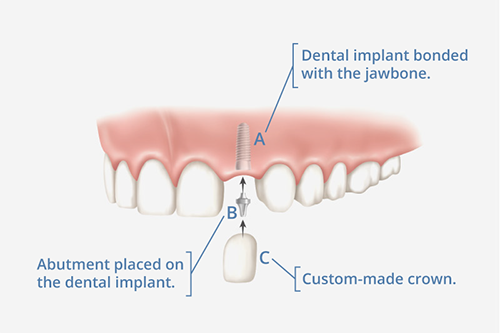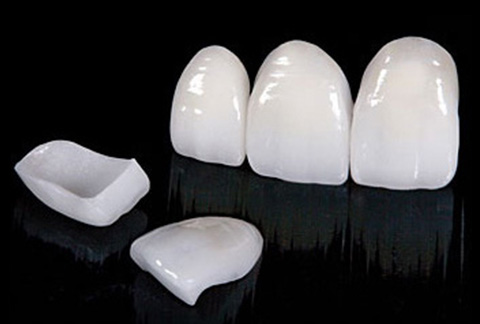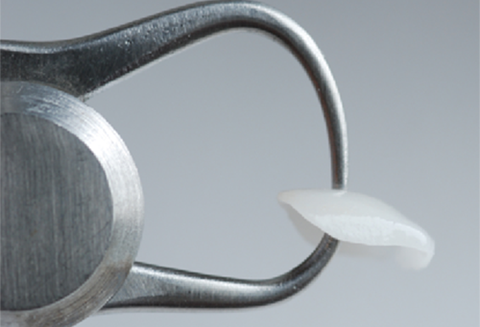What are dental implants?
Dental implants are the closest you can get to healthy, natural teeth. They allow you to live the way you want to – confidently eating, smiling, laughing, talking, kissing and enjoying all of your everyday activities without worrying about your teeth.

Think of dental implants as artificial tooth roots, similar in shape to screws. When dental implants are placed in your jawbone (A), they bond with your natural bone. They become a sturdy base for supporting one or more artificial teeth, called crowns.
A connector – known as an abutment (B) – is placed on top of the dental implant to hold and support your crowns. The crowns are custom-made to match your natural teeth and fit your mouth (C).
Not only do implants have less complications than other tooth replacement options, they offer important benefits. Implants will promote jaw health by reducing, or stopping, the progression of bone loss. Bone loss left unchecked can lead to many problems including toothaches, further tooth loss, and structural impact to the face.
Proper planning by a surgeon entails the doctor completing a thorough examination of your mouth to assess the health of your gums and jaw bone.
Dental X-rays give your surgeon and idea of your overall oral health, thus providing clues as to whether a dental implant will succeed.
Planning also involves an understanding of your medical history. This includes any medical conditions you have, as well as any medications you take.
When there’s a lack of understanding or proper planning, a surgeon may proceed with a dental implant even when the person isn’t the right candidate for one.
This can cause improper placement of the implant and stress at the implant site, resulting in the growth of aerobic bacteria which can trigger infections or an abscess.
Careful planning is also how your surgeon identifies issues that could interfere with an implant. For example, you may need a sinus lift before getting an implant to ensure success.
As you look for an experienced surgeon, talk with friends or family who’ve had a dental implant and ask for their recommendations.
Numerous factors can affect the success of a dental implant. These include:
1. Gum disease
Healthy gums are a criteria for dental implant surgery, and you can’t have this procedure with active gum disease.
Gum disease is an infection that can damage the gums and jaw bone. An untreated infection could develop around the implant and lead to failure. See a dentist to treat gum disease before getting an implant.
2. Smoking
Smoking can also cause dental implant failure because it restricts blood flow to the gums, slowing the healing process. Multiple research studies show that smokers can have a dental implant failure rate up to 20 percent.
Being a smoker doesn’t mean that you’re ineligible for a dental implant. However, you may have a better outcome if you stop smoking one week prior to a dental implant and if you don’t smoke for at least two months after implant placement.
3. Insufficient jaw bone
A successful procedure is also dependent on sufficient bone to support the implant. Without enough healthy bone, the surgeon cannot surgically place the implant into your jaw.
Bone loss can happen with osteoporosis. This condition develops when bone density decreases. Bones become fragile and there’s the increased risk of fractures. Severe gum disease can also cause deterioration of bones in the mouth.
4. Medical conditions
Dental implant failure is a possibility if you’re diagnosed with an autoimmune disease or conditions like rheumatoid arthritis and diabetes, which causes the body to heal at a slower pace. Slow healing can prevent osseointegration, where the implant fuses or integrates with your jaw bone.
The use of certain medications can also lead to dental implant failure. So it’s important to discuss any medications (prescription and over-the-counter) that you’re currently taking with your oral surgeon.
In 2016, McGill University researchers found that heartburn medications may reduce new bone growth, thus affecting how an implant fuses with the jaw bone. Also in 2016, researchers at the University at Buffalo reported similar results among people taking antidepressant medication.
5. Poor dental maintenance
The ability to practice good oral hygiene after a dental implant also has an impact on the success rate. You’re not an appropriate candidate for a dental implant if you have limitations that affect your range of motion or interfere with the ability to thoroughly clean your teeth.
6. An inexperienced surgeon
Not all surgeons are created equal, and there’s a chance of dental implant failure if you have an inexperienced surgeon. Your dentist may refer you to an oral surgeon, but you can also select your own.
An experienced surgeon knows how many implants to use to support tooth replacement. This is important because too few implants can cause excessive stress on the implant and failure.
Also, working with a skilled surgeon may prevent iatrogenic trauma, which is injury to the periodontal tissue by a dentist’s activity.
Choose a surgeon with many years of experience. Have them go over the process and recovery plan.
 copy.png)
Dental Prosthetics Over Implants
1.- Single implant and bridge over implants
A single implant substitutes a single tooth that has been lost or needs to be extracted. Bridge over implants substitutes 3 consecutive teeth with 2 implants over a bridge.

The above illustration shows three different options for replacing three missing teeth.
2.- Snap on Dentures
A removable complete denture supported by locator-connectors to the implants. The denture can be removed by the patient for cleaning. It requires a minimum of two implants and a maximum of four.
3.- Fixed Dental Appliance
The material used to make hybrid dentures over dental implants is a metal structure, covered by injected resin or acrylic. It can also be made of zirconium . This prosthetic device is not removable, and screws to the implants that are already placed in the jaw bone. Requires 4 to 6 implants in each arch. The type of treatment possible, is determined by the quality of the bone of the patient.

What Are Dental Veneers?
Porcelain lamina veneers are porcelain leaves that are 0.2 to 0.7 cm in thickness, attached to anterior surfaces of teeth and appear like contact lens. Porcelain laminates are routinely used as a way of making changes for teeth that are discolored, worn, chipped, and malformed, have spaces between them or are slightly misaligned. It is one of the most efficient methods that is used in smile design and restoration/reconstruction of color, form and function of tooth.
Teeth are assessed in baseline examination and treatment options and restorations that fit facial shape, skin color and characteristics of the patient are addressed. Models are molded, after measurements are made before treatment is started, and thus, a plan is made that includes procedures required to achieve targeted smile.


So what exactly are dental veneers?
They are ceramic (usually Porcelain) or other composite resin-based ultra-thin shells, which are affixed onto the front of the patients’ teeth.
The simplicity of the procedure involved means that it is not only cheap to undergo, but requires from little or no anesthesia to perform.
Many patients ask: “are these durable?” and the answer is yes: once affixed, veneers will handle most, if not all, of the forces that they will be subject through from a normal diet.
The result: A set of teeth that deliver a beaming new smile while also being fully functional!
Why Choose Dental Veneers?
It used to be that veneers were only affordable to Hollywood stars or those associated with show business.Dental veneers are a cosmetic dental treatment that can help you achieve that ” Hollywood Smile” you want.
With affordability no longer a barrier, dental veneers are now used to address a vast array of dental challenges, including:
- Malformed teeth – Individuals with broken, chipped or severely worn off teeth are ideal candidates for dental veneers
- Discoloured teeth – Thanks to the amazing properties of the veneer materials, veneers can be constructed in a way that they completely hide discolouration of teeth. And where one has only a few discoloured teeth, veneers can be used to blend the bad teeth to the colour of their healthier neighbours
- Unsightly teeth gaps – Some individuals have irregular gaps between teeth which makes their smiles seem unsightly. With veneers, dental specialists can fill those gaps to make the teeth look completely naturally spaced
- Crooked teeth – Teeth that have irregular shapes, are crooked or improperly positioned can be masked with the help of veneers. The result is an amazingly even set of teeth that look perfectly shaped and aligned with the rest of the teeth
- In some instances, veneers can serve as a better alternate for patients who may be considering dental crowns. And because they last for a long time, are relatively cheaper and comparably painless (compared to other dental procedures) to install, they make the ideal choice for dealing with a number of dental issues.